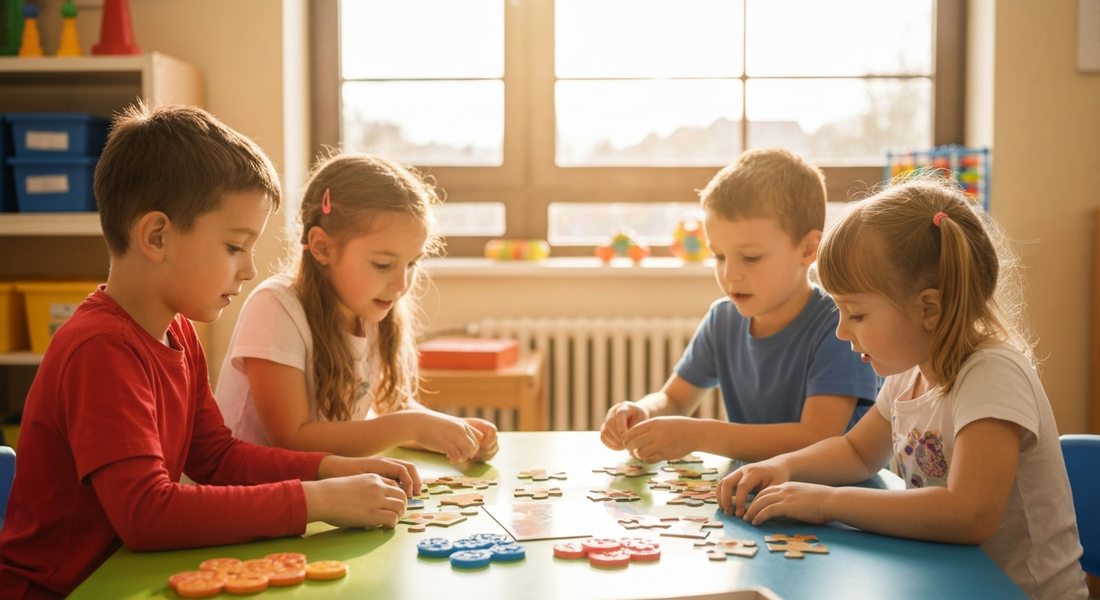Key Highlights
- Problem-solving activities provide engaging learning experiences for students of all ages.
- Working in small groups on challenges helps build teamwork and communication skills.
- These activities are essential for developing strong critical thinking skills and adaptability.
- Games and challenges encourage a growth mindset by framing problems as opportunities.
- You can easily adapt activities for different subject areas and age groups in the classroom.
- Kids learn to approach problems with confidence and find creative solutions.
Introduction
Helping kids develop strong problem-solving skills is crucial for their success both in and out of the classroom. By integrating fun challenges and games into their learning experiences, you can empower them to think critically and tackle obstacles with confidence. These activities are not just for one subject area; they can be used across the curriculum to make learning more hands-on and engaging. When students work in small groups, they also learn to collaborate and communicate effectively.
Benefits of Problem-Solving Activities for Kids
Engaging children in problem-solving activities offers numerous benefits that extend far beyond academic achievement. These tasks are fundamental in building essential critical thinking skills, teaching kids to analyze situations and approach challenges from different angles. They foster adaptability and solid reasoning, which are vital in a constantly changing world.
Through these experiences, you help children develop a resilient mindset. Instead of being discouraged by obstacles, they learn to seek creative solutions and view problems as chances to grow. Let's explore how these activities build specific skills and mindsets.
Building Critical Thinking and Life Skills
Problem-solving scenarios are a fantastic way to nurture critical thinking. When faced with a challenge, children must learn to break it down, identify key information, and analyze the situation from multiple perspectives. This process moves them beyond simply memorizing facts and encourages them to become independent thinkers who can draw their own conclusions.
This type of analytical reasoning is a cornerstone of many essential life skills. As children practice weighing options and considering potential outcomes, they improve their decision-making abilities. This practice helps them navigate everyday social interactions, academic tasks, and personal challenges more effectively.
Ultimately, these activities build confidence and adaptability. By regularly tackling and solving problems, kids become more comfortable with uncertainty and better equipped to handle real-world situations. They develop the skills needed to manage conflicts, think on their feet, and find solutions independently.
Encouraging a Growth Mindset Through Games
Games and challenges are powerful tools for fostering a growth mindset in children. When an activity is engaging and fun, it reframes failure as a natural part of the learning process. Instead of giving up, kids are motivated to try different strategies and persist until they find a solution. This builds resilience and teaches them that effort leads to improvement.
This positive mindset is crucial for long-term success. A growth mindset helps children believe that their abilities can be developed through dedication and hard work. Problem-solving games provide a safe environment to test this belief, as they can experiment with creative solutions without fear of getting it "wrong."
By celebrating the process of trying and iterating, you reinforce the idea that challenges are opportunities to learn. This shift in mindset encourages kids to embrace new problems with curiosity and enthusiasm, knowing that every attempt helps them grow smarter and more capable.
Fun and Engaging Problem-Solving Games for Children
Introducing problem-solving through games makes the learning process exciting and memorable. These engaging activities transform abstract thinking into hands-on fun. When kids work together in small groups or with a classmate, they share ideas and build on each other's strengths, creating rich learning experiences.
Many group activities are designed to be quick and easy to set up, making them perfect for any classroom. From mystery games to building challenges, there's a wide variety of options to keep kids motivated. Let's look at some specific challenges you can adapt for different ages.
Easy Classroom and Group Challenges for Different Age Groups
You can easily implement problem-solving activities for any age group with simple materials and clear instructions. Working in small groups, students can tackle fun challenges that boost their critical thinking. For elementary students, activities like "The Detective Game," where they solve a mystery using clues, are highly engaging. Another great option is "The Build," where kids use materials like straws and paper cups to construct a tower or bridge.
For older students, these activities can be adapted to be more complex. The core principles of collaboration and creative thinking remain the same. Here are a few ideas that work well for various age groups in the classroom:
- What If…: Students discuss moral dilemmas and explain their reasoning.
- Escape Room: Teams work together to solve puzzles and "escape" a themed room.
- Scavenger Hunt: Students solve clues to find items, promoting analytical thinking.
- Move IT!: A team must move an object across the room with specific constraints.
These group activities can be tailored to different subject areas. Here is a simple breakdown:
|
Activity |
Subject Area Connection |
Skills Practiced |
|---|---|---|
|
The Detective Game |
History, Literature |
Analyzing clues, reasoning |
|
The Build |
STEAM, Physics |
Creative solutions, collaboration |
|
What If… |
Social Studies, Ethics |
Decision-making, reasoning |
Conclusion
In conclusion, engaging kids in problem-solving activities is not just fun; it also lays the foundation for critical thinking and essential life skills. These games and challenges foster a growth mindset, encouraging children to approach problems with curiosity and creativity. By incorporating these activities into daily routines, parents and educators can create an enriching environment that promotes learning and development. Remember, the skills children gain through these enjoyable experiences will serve them well into adulthood. If you're ready to enhance your child's problem-solving abilities, get started today with our exciting range of games and challenges!

